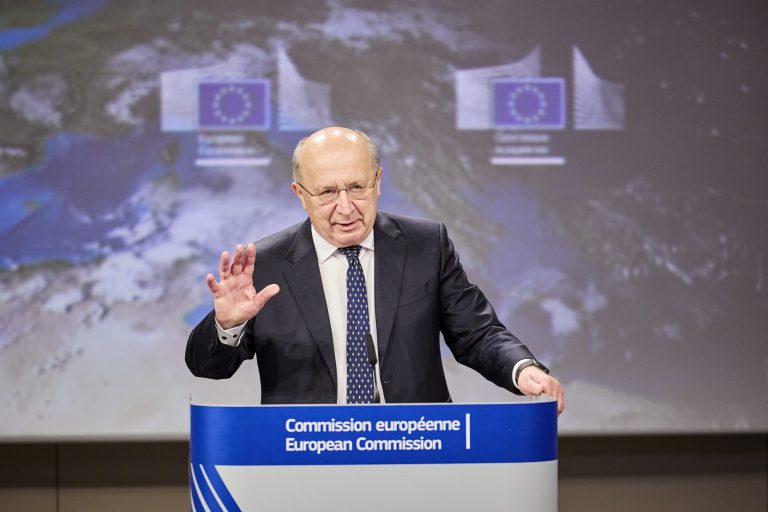WASHINGTON — The European Union has unveiled a long-anticipated space law, but details of how its space sustainability and other provisions will be implemented could take years to work out.
The European Commission released June 25 its legislative proposal for the EU Space Act, which would set rules on satellite and launch operations for its 27 member states. The draft bill, to be considered by the European Council and European Parliament, sets rules for entities operating satellites in Europe on topics such as collision avoidance, debris remediation and cybersecurity.
“It targets the most important problems and growing dangers that can endanger our future in space, namely, that space is increasingly congested and contested,” said Andrius Kubilius, the EU commissioner for defense and space, in a June 25 speech announcing the EU Space Act.
The act is meant to harmonize regulations among EU member states. Kubilius noted that only 12 of 27 EU nations have national space laws, whose contents vary. “This fragmentation is bad for business, bad for competitiveness, bad for our future in space,” he said.
Some major European countries, like Germany, are among those without a national space law. Germany has been working on such a law for a quarter century, said Ingo Baumann, a founding partner at BHO Legal, during a panel discussion organized by the French space agency CNES at the Paris Air Show June 17.
Those past efforts, he said, were hindered by “politicization,” he said, including comments by political figures in the country who said no law was better than a bad law that was burdensome on industry. “On that level, Germany will probably never have a law.”
Under the EU law, authorizations for space activities will be handed by member states, and those authorizations would apply across the EU. “There will be no new red tape, no extra layer of bureaucracy,” Kubilius declared in his speech.
The act will, as expected, apply not just to European companies but those outside Europe offering services in Europe. “If you target the EU with your services, then you will be subject the Space Act,” said Rodolphe Muñoz, team leader for space situational awareness and space traffic management in the European Commission’s directorate responsible for space, at the CNES event.
He added, though, that the act will support “mutual recognition equivalents” with third countries, where operators can show they are regulated in their home countries in a similar manner to the EU. “What we have developed in the EU Space Act is state of the art, and most other countries have this already developed,” he said.
While the act discusses various topics about space sustainability, it does not include specific requirements, such as deadlines for deorbiting spacecraft after the end of their life. Kubilius said in his speech that spacecraft will have to be deorbited no more than 25 years after end of life, although that would go down to just one year for spacecraft in very low Earth orbit.
Those details, Muñoz said, would be set out in an “implementing act” separate from the main legislation. “This is something we would never set directly in the law,” he said. “It will evolve, you might need to change it, you need to have some nuances that you cannot have in the basic law.”
That implementation could clash with national laws. France, for example, updated its national space law in 2024, replacing a 25-year reentry rule with a more complex approach where the post-mission disposal time is no more than three times the spacecraft’s operational lifetime, and not exceeding 25 years. However, spacecraft in LEO constellations of 100 to 1,000 satellites have a post-mission disposal time of five years, or two years for constellations of more than 1,000 satellites.
“We sometimes had satellites with a mission of one year or two years but remained in space for 25 years, and we think it is too much,” said Bernard Chemoul, inspector general of CNES, at the panel. He added that those regulations applied only to French satellite operators, not those in other countries providing services in France.
Member states will have to comply with the EU law, said Muñoz. “However, this EU law gives some leeway to member states to adopt rules that go further for their own operators,” he added.
The act also includes a provision to establish a “Union Space Label Framework” that would award ratings to operators based on how well they comply with requirements for minimizing debris, collision risks and other environmental impacts. It would be analogous to the Space Sustainability Rating project initiative by the World Economic Forum and currently implemented by Swiss university EPFL.
While the Space Act draft has finally been introduced, “it is only the beginning of the game,” said Muñoz, as member states and the parliament debate and amend the act, a process he estimated could take one and a half to two years.
That will be followed by an implementation phase. The draft of the act states that its regulations will not apply to spacecraft launched before January 2030.

